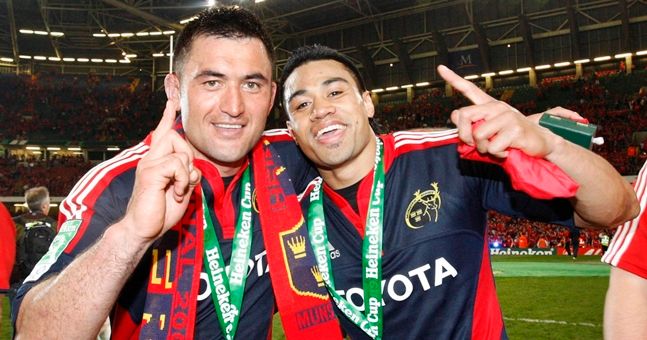

Share
23rd October 2019
04:07pm BST

"Remember when Denis Leamy played?" he asked. "Leamy was a good athlete but he was a phenomenal footballer. That was the difference and that is what made him stand-out. It's about getting guys that can stand flat on the line and pass the ball. People with good catch-pass skills."Flannery also recalled a turning point for Munster, before they won the 2008 Heineken Cup, and a 2010 training session with Ireland that proved even the best team in the northern hemisphere had a lot to learn.
 "The difference between Ireland and the All Blacks," says Flannery, "is they can manufacture a score with far less effort than Ireland would have to put in. So it never feels like they're a million miles away.
"Even when the opposition score two tries, the All Blacks will feel that if the opposition make a mistake, they can carve it up and get a score back quickly." He continued:
"The difference between Ireland and the All Blacks," says Flannery, "is they can manufacture a score with far less effort than Ireland would have to put in. So it never feels like they're a million miles away.
"Even when the opposition score two tries, the All Blacks will feel that if the opposition make a mistake, they can carve it up and get a score back quickly." He continued:
"I remember at Munster, in 2006, we won the European Cup but said to ourselves, 'My God, it is so hard for us to score a try'. We have to win a penalty, kick into touch, maul, win a penalty, kick it to touch, get the 12 to hit it up. 500 phases to get a try and we're going back to the halfway line, exhausted. "We said that year that we're not going to be competitive in Europe again unless we can manufacture a try out of nothing. Two years later, we had signed Lifemi Mafi, Rya Tipoki and Doug Howlett, and the lads could pull a try out of their ass; out of nothing; and I wouldn't even touch a breakdown."The short-term solution boat - signing Kiwis - is about to sail but Ireland now have Jamison Gibson Park and Rhys Marshall Irish-qualified and available to new head coach Andy Farrell. Jarrad Butler and James Lowe follow soon after. James Lowe - Irish qualified in November 2020 - would tick all of the boxes mentioned by Flannery but there are up-and-coming, as well as current, players that could be drafted into the Ireland set-up to improve that area of their game. Ireland can't be hanging around for Lowe to come off the ranks. Flannery feels that identifying good footballers currently in the system and getting the right coaches to bring them into the fold would help. Longer term, the coaches themselves needed up-skilling - something High Performance Director David Nucifora is already looking into - and the focus needs to be on the 10 to 12 year olds. We may not see the full benefits until 2027 or 2031 World Cups (but who wants to hear that?!) Even when a team looks to be at the top of the game, and the world, there is always room for improvement. Ireland discovered that this year, after a glowing 2018, and that resonates to Flannery. He recalls some training sessions not long after Ireland won their first Grand Slam of the professional era, in 2009.
"To try give people an example of what I'm trying to say - when we won the Grand Slam in 2009, we spent a weekend camp in Belfast practising switches. I was 31 years of age and we spent a weekend just practising switches, and we were really poor at it. "That's a fundamental part of the game - being able to run a switch. But we were so poor at it. And I said to myself, 'We're pretty much the best team in Europe at the minute, as we've won the Grand Slam, and we can't even run f***ing switches'. "You imagine just having kids of 11 and 12 just running switches and see how good they'd be when they get to international level."Flannery says there is a lack of focus on the fundamentals as northern hemisphere often falls back into the 'sh**-fights' that develop when the weather worsens, from October through to March. Set-pieces and kicking is king but the All Blacks are racking up World Cups with their running game, and handling all other aspects adeptly too.
Explore more on these topics: